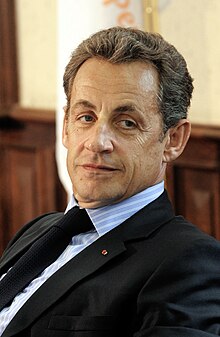
Back رئاسة نيكولا ساركوزي Arabic Presidencia de Nicolas Sarkozy AST Presidencia de Nicolas Sarkozy Spanish Présidence de Nicolas Sarkozy French
 Sarkozy in 2010 | |
| Presidency of Nicolas Sarkozy 16 May 2007 – 15 May 2012 | |
| Cabinet | |
|---|---|
| Party | UMP |
| Election | 2007 |
| Seat | Élysée Palace |
|
| |
The presidency of Nicolas Sarkozy began on 16 May 2007 when Nicolas Sarkozy became the sixth President of the French Fifth Republic, following his victory in the 2007 presidential election. A candidate of the conservative Union for a Popular Movement (UMP), he nominated François Fillon as Prime minister, who formed a composite government, a bit modified following the UMP's relative victory during the June legislative election. Although the UMP had not obtained a majority as large as expected, Nicolas Sarkozy could launch the reforms he had pledged as a candidate as soon as he was elected. However, he tried to open his government to the opposition party, appointing several politicians close to the opposition parties.[1]
With the quinquennat reform of 2000, the president of the republic has a five-year term to lead freely the domestic policy he wants, if ever he obtains the majority at the legislative election, which is very likely to occur.[2] Traditionally, according to the Constitution of the French Fifth Republic, the main role of the President of the Republic is to determine the foreign policy of the nation, while the Prime Minister is entrusted with leading the domestic policy.[3] However, as François Fillon was politically very close to the President, Nicolas Sarkozy could be very active both in foreign relations and in domestic reforms. French journalists have called him a "hyper-président", to insist on his will to solve many important problems and his omnipresence in all domains.[4][5][6] Some media even compared him with Napoléon Bonaparte[7][8] and Louis XIV[9] to refer to his will to control and change everything.[10] While the popularity of the president was very high at the beginning of his mandate, it rapidly declined during the first months of his mandate, and the government faced several protests.
The presidency of Nicolas Sarkozy was marked by the global financial and economic crisis. As President-in-Office of the European Council during the last six months of 2008, and as the president of a member country of the G-8 and the G-20, Nicolas Sarkozy was very much involved in the international debates and propositions to fight against the crisis.[11][12] He had also to cope with the economic and social effects of the crisis in France. In particular, he had to renounce to reduce the public deficit as he had promised, and instead he had to launch a stimulus package,[13] as part of the 2008 European Union stimulus plan, to limit social discontentment. As he had promised to reach full-employment and to boost the economic growth, he faced growing protest. In the 2012 presidential elections, Sarkozy was defeated by Socialist François Hollande by a margin of 3.2%.
- ^ Lichfield, John (19 May 2007). "Sarkozy unveils his new 'rainbow' government". The Independent. London. Archived from the original on 24 April 2009. Retrieved 22 May 2010.
- ^ Astier, Henri (16 May 2007). "What now for Nicolas Sarkozy?". BBC News.
- ^ "Constitution of 4 October 1958". National Assembly of France.
- ^ "Profile: Nicolas Sarkozy". BBC World Service. 26 July 2009. Retrieved 22 May 2010.
French President Nicolas Sarkozy has earned himself the nickname of the "hyper-president", a leader who never stops.
- ^ Alain Duhamel (30 April 2009). "Nicolas Sarkozy, deux ans après". Libération.
- ^ "L'hyper-président", Le Monde, 6 June 2007 (in French) «Le nouveau président de la République a marqué des points grâce à son style direct, son art de la communication, son omniprésence sur tous les fronts intérieurs et extérieurs, sa volonté affichée d'engager les réformes promises»
- ^ "Le Talleyrand de Sarkozy, c'est Bolloré et son yacht !". Libération (in French). 14 February 2009.
- ^ Schofield, Hugh (15 January 2009). "Is Sarkozy the new Napoleon?". BBC News. Retrieved 22 May 2010.
- ^ John Lichfield (23 June 2009). "Sarkozy's Louis XIV moment". The Independent. London.
- ^ Lichfield, John (23 October 2009). "L'état, c'est moi: the cult of Sarko". The Independent. London.
- ^ Bremner, Charles (31 March 2009). "Nicolas Sarkozy spoils for G20 fight with 'Anglo-Saxons'". The Times. London.
- ^ Briancon, Pierre (26 August 2009). "Sarkozy receives cold shoulder from G20 in his battle to keep bankers in check". The Telegraph. London. Retrieved 22 May 2010.
- ^ "Sarkozy unveils €26bn stimulus package". Financial Times. 4 December 2008.
© MMXXIII Rich X Search. We shall prevail. All rights reserved. Rich X Search
